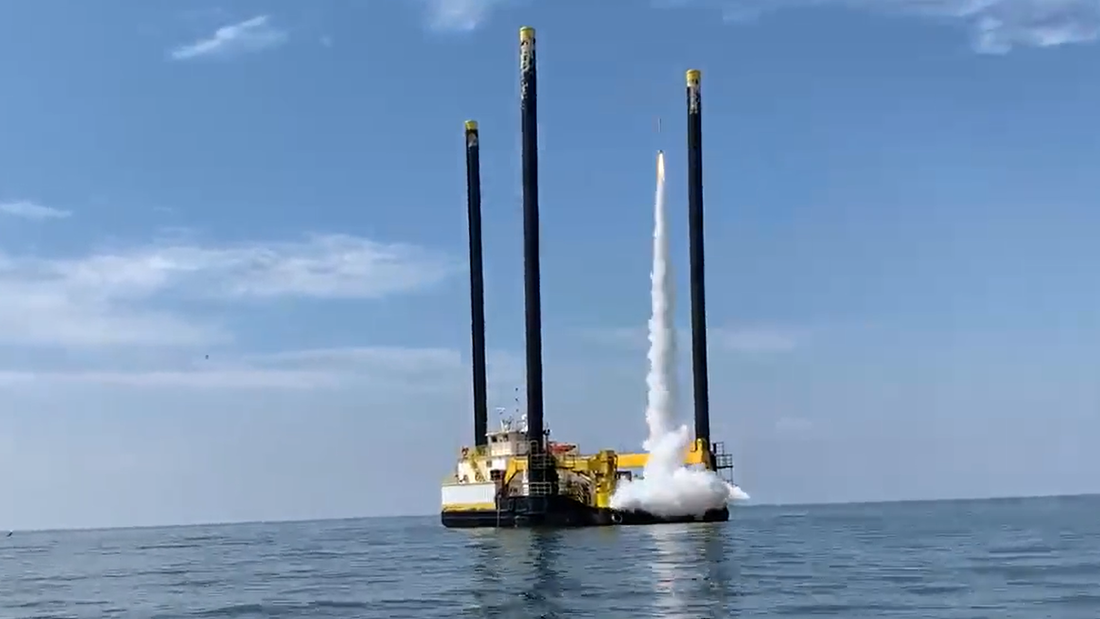
1st Rocket Ever Launched From Floating Pad
Share
Exciting news emerged on Tuesday the 23rd of May as the inaugural rocket launches from US territorial waters were announced. The Spaceport Company successfully conducted multiple suborbital rocket launches from a modified ship located in the Gulf of Mexico. Their groundbreaking objective is to alleviate the strain on busy rocket ranges and accelerate the deployment of satellites into space.
CEO and founder of The Spaceport Company, Tom Marotta, expressed his enthusiasm for this accomplishment, stating, "This demonstration provided valuable insights that will be incorporated into our next endeavour: the construction of a sea-based spaceport capable of orbital operations." The launches took place following regulatory approvals from the Federal Aviation Administration (FAA) and the US Coast Guard. The FAA meticulously conducted an environmental assessment and hazard clearance, while the US Coast Guard actively monitored the launch range. The National Security Innovation Capital program, associated with the Pentagon's Defense Innovation Unit (DIU), also played a role in facilitating these demonstrations.
— TheSpaceportCompany (@TheSpaceportCo) May 23, 2023
The propulsion for these launches was provided by Evolution Space, a California-based solid propulsion launch provider, while the airframes were procured through an independent contractor, Rick Maschek. Evolution Space and The Spaceport Company highlighted the "reduced environmental impact" of the at-sea launches compared to those from land-based launch sites, although specific details were not provided.
A recent incident involving SpaceX brought environmental concerns to the forefront. The maiden launch of Starship, the largest launch system globally, had to be aborted mid-flight. The launch of Starship and its Super Heavy rocket resulted in the creation of hazards, including debris and sand, which are now being evaluated by the FAA. The FAA had previously conducted an 18-month-long environmental assessment of the launch site in Boca Chica, Texas. Environmental groups have recently filed a lawsuit against the FAA, with SpaceX joining the administration in their legal battle.
In a recent article for The Space Review, Marotta emphasized that launching from sea is the most viable solution to alleviate the bottleneck faced by spaceports. He highlighted the challenges faced by proposals for land-based spaceports in the US, which have been frequently "delayed or permanently blocked by local community opposition." Additionally, international options require lengthy export control approvals from the US State Department.
Marotta also acknowledged that other companies have explored sea-based launch options in the past. Boeing had partnered with Russia for 15 years to leverage sea launch opportunities until the relationship was severed due to Russia's invasion of Crimea in 2014. SpaceX is also exploring the concept of offshore launch platforms, and countries like South Korea and China have their own sea launch systems.
While some companies are turning towards small spaceports in other parts of the world, alternative options are emerging. For instance, Nova Scotia is developing a spaceport in close consultation with the local community, and the UK and Europe boast various launch sites, with some designed to minimize infrastructure by utilizing mobile shipping containers.
The possibilities of space exploration are expanding, and the advent of rocket launches from US territorial waters marks a significant milestone.
You’ve come this far…
Why not venture a little further into A.S.S. - our exclusive Australian Space Society.
And keep thrusting Australia into the deep unknown…
#Space_Aus




